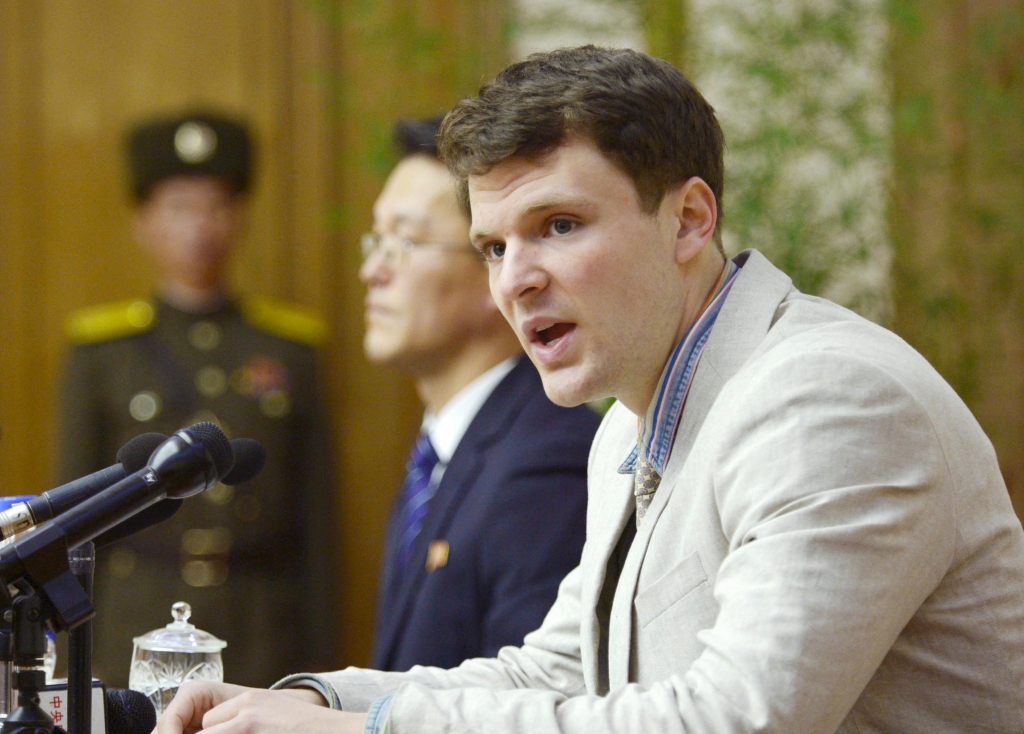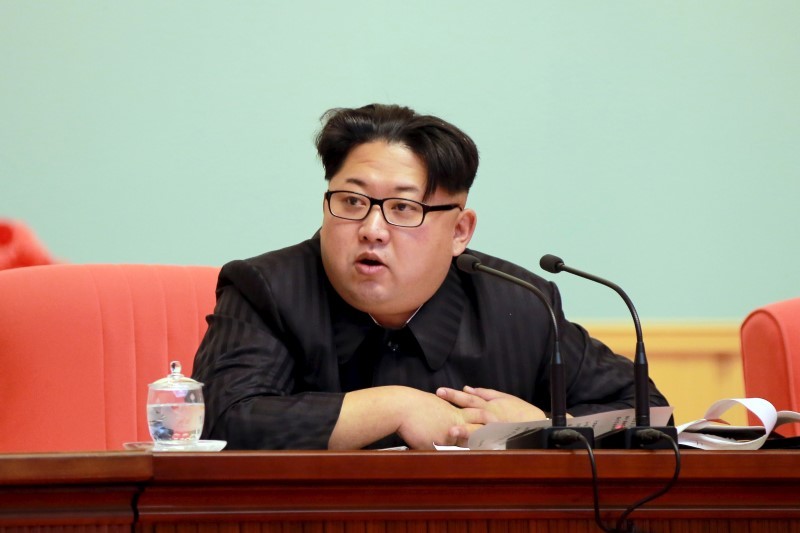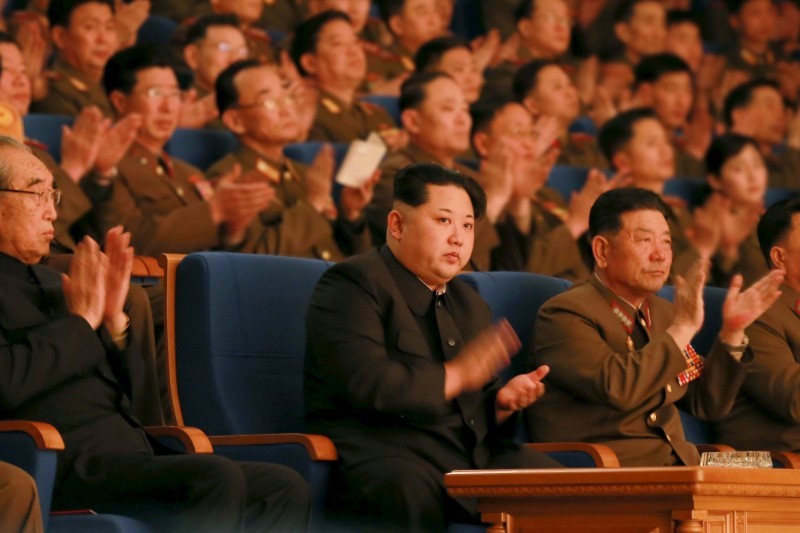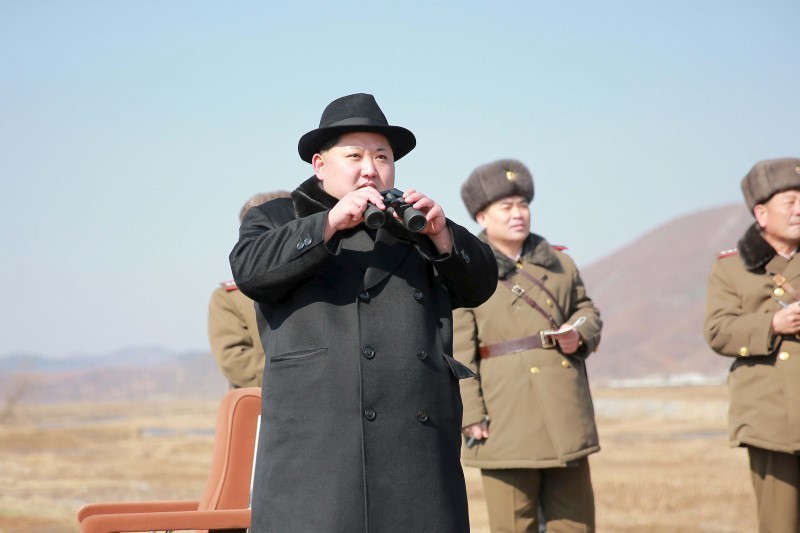
SEOUL (Reuters) – A U.S. student held in North Korea since early January was detained for trying to steal an item bearing a propaganda slogan from his Pyongyang hotel and has confessed to “severe crimes” against the state, the North’s official media said on Monday.
Otto Warmbier, 21, a University of Virginia student, was detained before boarding his flight to China over an unspecified incident at his hotel, his tour agency told Reuters in January.
North Korea has a long history of detaining foreigners and has used jailed U.S. citizens in the past to exact high-profile visits from the United States, with which it has no formal diplomatic relations.
“I committed the crime of taking out a political slogan from the staff-only area of the Yanggakdo International Hotel,” the North’s KCNA news agency quoted Warmbier as telling media in Pyongyang, the North Korean capital. It did not say what the item was.
CNN showed video of a sobbing Warmbier saying: “I have made the worst mistake of my life, but please act to save me.”
Warmbier said a “deaconess” had offered him a used car worth $10,000 if he could present a U.S. church with the slogan as a “trophy” from North Korea, KCNA said.
The acquaintance also said the church would pay his mother $200,000 if he was detained by the North and did not return, KCNA quoted Warmbier as saying.
“My crime is very severe and pre-planned,” Warmbier was quoted as saying, adding that he was impressed by North Korea’s “humanitarian treatment of severe criminals like myself.”
The White House said on Monday it was aware of Warmbier’s situation and was working closely with Sweden, the United States’ protecting power in North Korea, to learn as much as it can about Warmbier’s detention.
“There’s no greater priority for the administration than the welfare and safety of U.S. citizens abroad,” White House spokesman Josh Earnest told a daily briefing.
Warmbier’s parents have not heard from him since his arrest, according to a statement from his family provided by the University of Virginia.
“I hope the fact that he has conveyed his sincere apology for anything that he may have done wrong will now make it possible for the DPRK (North Korea) authorities to allow him to return home,” the statement said.
“I urge the DPRK government to consider his youth and make an important humanitarian gesture by allowing him to return to his loved ones.”
Other Westerners detained in North Korea previously have confessed to crimes against the state.
North Korea’s state media said in January that Warmbier “was caught committing a hostile act against the state”, which it said was “tolerated and manipulated by the U.S. government”.
The senior pastor at Friendship United Methodist Church in Wyoming, Ohio, told CNN he did not know the person identified by Warmbier in the KCNA story as a deaconess there, and said Warmbier was not a member of the congregation.
Warmbier, a member of the Theta Chi fraternity at the University of Virginia, is studying economics with a minor in global sustainability, according to his Linkedin page. Members of the fraternity were not immediately available for comment.
Warmbier was a finance and operations intern at Finishing Technology, his father’s firm, from June 2010 to August 2013, and helped run a student investment fund at the University of Virginia, according to his Linkedin profile.
He also took a class at the London School of Economics and Political Science in 2015.
According to KCNA, Warmbier said he was encouraged in his act by a member of the Z Society, an elite philanthropic organization that he hoped to join at the university.
An official in the university’s communications office could not immediately be reached for comment.
Warmbier grew up in Wyoming, Ohio, northeast of Cincinnati. He attended Wyoming High School, where he was the salutatorian of his graduating class and was named student of the year, according to Linkedin.
A district spokeswoman declined to speak about his time at the school.
Warmbier was active in swimming when he was younger, according to a blog operated by a local athletic booster organization, and he volunteered as a coach for a local children’s swim team.
Warmbier, on a five-day New Year’s tour of North Korea with a group of 20, was delayed at immigration before being taken away by two airport officials, according to a tour operator that had sponsored the trip.
While most tourists to North Korea are from China, roughly 6,000 Westerners visit annually, though the United States and Canada advise against it.
Most are curious about life behind the last sliver of the iron curtain and ignore critics who say their dollars prop up a repressive regime.
Isolated North Korea is expected to face a tough new U.N. Security Council resolution tightening sanctions against it following its nuclear test in January and a long-range rocket launch this month.
(Additional reporting by Jee Heun Kahng in Seoul, Brendan O’Brien in Milwaukee, Marcus Howard in New York and Megan Cassella in Washington; Editing by Nick Macfie and James Dalgleish)











